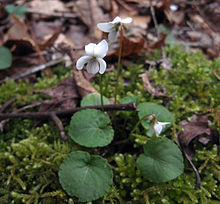Viola blanda
| Viola blanda | |
|---|---|

| |
| Scientific classification | |
| Kingdom: | Plantae |
| Clade: | Tracheophytes |
| Clade: | Angiosperms |
| Clade: | Eudicots |
| Clade: | Rosids |
| Order: | Malpighiales |
| Family: | Violaceae |
| Genus: | Viola |
| Species: | V. blanda |
| Binomial name | |
| Viola blanda | |
| Synonyms | |
Viola blanda, commonly called the sweet white violet,[2] is a flowering perennial plant in the Violet family (Violaceae).[2] It is native to parts of south-eastern and south-central Canada and the eastern, and north-central, United States.[2] Its natural habitat is in cool, mesic forests.[3]
Description
The sweet white violet grows from 6 to 12 inches high. They grow small white flowers in spring and early summer. The lower petals have purple veins. The upper petals are often twisted or bent backwards. The stalks are a reddish tinged. They grow 1-2 inch long heart shaped leaves with a few scattered hairs.
The white violet has demonstrated a weak ability to respond to climate change by shifting its flowering time in some areas of its range.[citation needed]
References
- ^ "Viola blanda". Germplasm Resources Information Network. Agricultural Research Service, United States Department of Agriculture. Retrieved 2010-03-09.
- ^ a b c NRCS. "Viola blanda". PLANTS Database. United States Department of Agriculture (USDA). Retrieved 2010-03-09.
- ^ "Flora of the Southern and Mid-Atlantic States".

